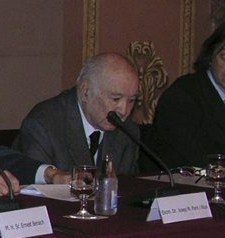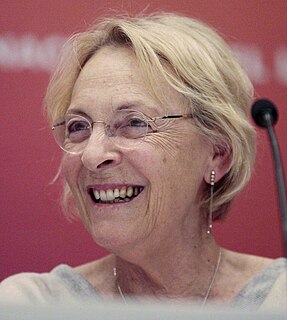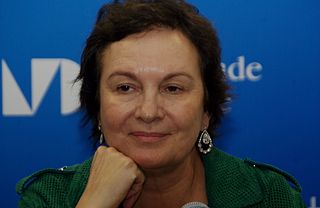Related Research Articles

Manuel Vázquez Montalbán was a prolific Spanish writer from Catalonia: journalist, novelist, poet, essayist, anthologue, prologist, humorist, critic and political prisoner as well as a gastronome and a FC Barcelona supporter.
Premio Nadal is a Spanish literary prize awarded annually by the publishing house Ediciones Destino, part of Planeta. It has been awarded every year on 6 January since 1944. The Josep Pla Award for Catalan literature is given at the same ceremony.

Carlos Ruiz Zafón was a Spanish novelist widely known for his 2001 novel La sombra del viento.
Sergio Pitol Deméneghi was a Mexican writer, translator and diplomat. In 2005, he received the Cervantes Prize, the most prestigious literary award in the Spanish-speaking world.
Luisa Castro is a Spanish writer and journalist who has published in Galician and Spanish. She has lived in Barcelona, New York City, Madrid and Santiago de Compostela. She is currently Director of the Instituto Cervantes in Bordeaux, France.
The Premio Planeta de Novela is a Spanish literary prize, awarded since 1952 by the Spanish publisher Grupo Planeta to an original unpublished novel written in Spanish. It is one of about 16 literary prizes given by Planeta.

Alberto Ruy-Sánchez Lacy is a Mexican writer and editor born in Mexico City on 7 December 1951. He is an author of fiction, non-fiction and poetry. Since 1988 he has been the chief editor and founding publisher of Latin America's leading arts magazine, Artes de Mexico. He has been a visiting professor at several universities including Stanford, Middlebury and La Sorbonne, and has been invited to give lectures in Europe, Africa, Asia, North America and South America. His work has been praised by Octavio Paz, Juan Rulfo, Severo Sarduy, Alberto Manguel and Claude Michel Cluny and has received awards from several international institutions.

Martí de Riquer i Morera, 8th Count of Casa Dávalos was a Spanish–Catalan literary historian and Romance philologist, a recognised international authority in the field. His writing career lasted from 1934 to 2004. He was also a nobleman and Grandee of Spain.

Rosa Regàs is a Spanish writer and novelist. She is a recipient of the Premio Planeta de Novela and the Premio Nadal.

Germán Gullón, literary critic and writer, is a professor of Spanish literature and member of the Amsterdam School for Cultural Analysis at the University of Amsterdam. He has authored, beside his scholarly works and essays, two books of short stories, Adiós, Helena de Troya and Azulete, and two novels, Querida hija and La codicia de Guillermo de Orange.

Eduardo Mendoza Garriga is a Spanish novelist.

Soledad Puértolas Villanueva is a Spanish writer, and on 28 January 2010 was named an inmortal or member of the Real Academia Española. She is a recipient of the Premio Planeta de Novela.

Planeta Corporación, S.R.L., doing business as Grupo Planeta, is a Spanish mass media conglomerate operating in Spain, Portugal, France and Latin America. It is the world's leading Spanish-language book publisher.

Clara Sánchez is a Spanish novelist. Among other literary awards, Sánchez won the 2013 Premio Planeta de Novela for her novel El cielo ha vuelto.

Juan Eslava Galán is a Spanish writer of historic genre, both fiction and non-fiction. He has published some of his works under the pen name Nicholas Wilcox.

Luis García Montero is a Spanish poet and literary critic, as well as a professor of Spanish Literature at the University of Granada.
Clara Obligado Marcó del Pont is an Argentine-Spanish writer.
The Tigre Juan Award is a Spanish literary award created in 1977 in honor of the novel Tigre Juan. El curandero de su honra by Ramón Pérez de Ayala. It is awarded to the best narrative work in Spanish published in the preceding year. It has had different sponsors: the founders, the Cervantes Bookstore, the Asturian Center, the City Council of Oviedo (1986–2009) and the Tribuna Ciudadana cultural association.

The Fernando Lara Novel Award is given annually in Spain by the José Manuel Lara Foundation and the Planeta publishing house to an unpublished novel in the Spanish language. The publication of the finalist (runner-up) work is not expected, although it is sometimes published by Planeta itself.
The Premio Biblioteca Breve is a literary award given annually by the publisher Seix Barral to an unpublished novel in the Spanish language. Its prize is €30,000 and publication of the winning work. It is delivered in February, to a work from the preceding year.